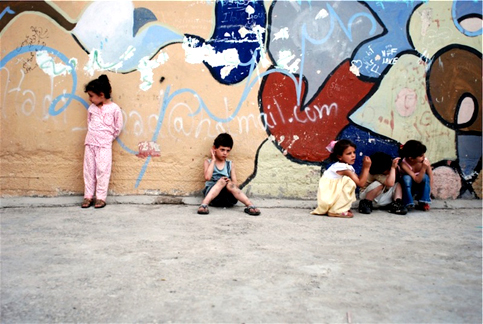Lebanese refugee camps as space of exception
- By Sari Hanafi, Wednesday, July 18, 2007. The Daily Star.

- Photo: Palestinian Children from Nahr el Bared seeking refuge
in the nearby Beddawi Camp, Tripoli, Lebanon, May 2007
Tayna Traboulsi
The battle between the Lebanese Army and Fatah al-Islam inside the Nahr al-Bared camp has lasted 40 days so far, resulting in huge destruction and displacing 30,000 people to the other camps. In Ein al-Hilweh, many arguments lead to clashes between armed young men. Some other camps are besieged in an attempt to control human and arms flows to the camps.
Fatah-al-Islam, Usbat al-Ansar, Jund al-Sham, are rather franchises of Al-Qaeda, which invest progressively in the space of the camp. Hypotheses have pointed the finger to Syria, to Saudi Arabia, certain local Lebanese factions, and to Al-Qaeda as supporting these groups, but regardless of the authorities behind them, they all know very well that the camp is a space of exception, a space out of place. How have we arrived at this point?
While the Lebanese state is present in the public space by the rule of urban laws, it has abandoned the camps and allowed them to become spaces devoid of laws and regulations. The urbanization process takes on a wild nature, stemming from the absence of planning policies. Everyone builds as he or she sees fit, and the result is hundreds of illegal buildings spreading in all directions. The process of the urbanization of the unregulated camps resulted in a large population suffering from poverty, living in slum areas surrounding the cities.
In this situation nothing is legally defined. Everything is suspended but upheld without written documents concerning this suspension. Camps had been under the Palestinian Liberation Authority (PLO) since the 1969 Cairo Agreement, but the expulsion of the PLO in 1982, has led to camps being governed by a web of complex power structures composed often of two popular committees, notables, factions, Islamist non-Palestinian groups, imams, PLO popular organizations, and UNRWA “directors.” These camp leaders have imposed measures which are as changing as the balance of power between these different groups. The interviews we conducted in different camps showed how camp populations have lived with the disarray caused by this state of exception. As a refugee express it: “Who can I complain to when my neighbor builds a second and third floor without leaving any proper space for my apartment?” Many interviewees used the word “chaos” to describe the situation in the camps.
Chaos, however, is not based on the absence of law but on the exclusion by the sovereign(s) of the population from the space where the law is operated (exclusion from the sphere of work and civil rights) while at the same time included in relation to security and paying taxes. At times, however, the situation comes closer to a state of void, filled in a very ad-hoc way as the result of the architecture of power structure.
While dating back to before 1970, the camps had been governed by the state of emergency where security forces had suspended the laws, after 1970 the police has not been able to penetrate the camps without negotiating with the powerful actors who decide whether to cooperate or not case by case. The camp population would resort to local notables and local security leaders in any quarrels before going to the police. However, refugee camps no longer enjoy harmonious communitarian structures. For quite some time we have witnessed the emergence of a new elite whose legitimacy is based on the national struggle. Nowadays this struggle alone is no longer sufficient for someone to become a powerbroker.
While historically the camp has been a laboratory of Palestinian society/state-in-making, it becomes now an experimental laboratory for control and surveillance. But beyond this, as formulated by Bernard Rougier, the camp has emerged as a sort of laboratory for the vast range of thought relating to politicized Islamism. Qualifying political Islamism as being against “Western civilization,” however, Rougier uses the same philosophy as US President George W, Bush of the self-fulfillment prophecy which ignores the material basis of the conflict: Western hegemony, US oil interests in the region and above all the ways in which the US supports Israeli colonial practices.


